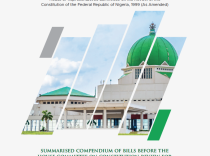The Senate has passed the Gender and Equal Opportunities Bill for second Reading. The Bill, sponsored by Sen. Biodun Olujimi (PDP:Ekiti) seeks to give effect to certain provisions of the 1999 Constitution (as amended) such as Chapters II and IV which deal with Fundamental Objectives and Directive Principles of State Policy and the Fundamental Human Rights. If eventually passed by the National Assembly, the Bill will also give effect to the United Nations Convention on the Elimination of all forms of Discrimination against Women (CEDAW) and the protocol to the African Charter on the rights of Women in Africa amongst others.
It would be recalled that the Bill had failed the second reading stage on 15th March 2016 after some Senators observed that some of the Bill’s provisions were contrary to some of Nigeria’s traditional and religious practices. In addition, some law makers were of the view that its provisions were inconsistent with some provisions of the constitution and in fact superfluous as the Nigerian constitution already guarantees freedom against discrimination. Consequently, Sen. Olujimi re-introduced a new Bill that reflected some of these concerns on 15th June, 2016.
Leading the debate on the Bill on Thursday 29th September 2016, Sen. Olujimi explained that the Bill prohibits discrimination against persons on grounds of gender, age or disability by any organ of government or private institution. She also stated that the Bill would promote equality, development and advancement of all persons, especially young women and girl children through the provision that special measures that would eliminate discrimination and increase political appointment positions for women in public and private spheres. The Bill recommends that a minimum of 35% of such positions should be reserved for women.
Sen. Olujimi also buttressed that the Bill would prohibit all forms of violence against women in public and private places and eradicate harmful socio-cultural practices by public, private and traditional institutions with a view to eliminating gender stereotyping, prejudices, and some barbaric customary practices. She then concluded by stating that the proposed N1.6 billion National Women’s Empowerment Fund given by President Buhari to finance loans to women across the country should be applauded and accorded requisite legal backing to ensure systems were put in place for its sustainability.
Contributing to the debate, Sen. Ike Ekweremadu (PDP:Enugu) stated that he was in support of the Bill but called for a further scrutiny of clause 4 of the bill at the Committee stage. According to him, clause 4 of the Bill, which provides for the adoption of Temporary Special Measures to Eliminate Discrimination was a duplication of section 42 (1) of the 1999 Constitution (as amended) which already provides for the right to freedom against discrimination. However, in response to Sen. Ekweremadu’s observation that clause 4 of the Bill duplicates the provisions of section 42(1) of the Constitution, Sen. Oluremi Tinubu (APC:Lagos) suggested an alteration of section 42(1) to ensure that it guaranteed access to women in political spheres. She also buttressed her view by citing the example of Mrs. Hillary Clinton who is the first woman nominated by a major political party in the United States to run for the President.
Sen. Binta Masi Garba (APC:Adamawa) further suggested an amendment to section 147(3) of the Constitution, which provides for Federal Character in the President’s selection of Ministers to include a 35% affirmative action for women.
The Bill has been referred to the Committee on Judiciary, Human Rights and Legal Matters who are to make their findings and report back to the Senate in four weeks.





